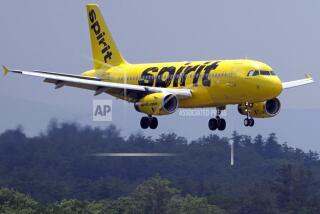Flying Tiger Plans to Liquidate; Talks With Pilots Stalled
- Share via
The financially troubled Flying Tiger air cargo line put itself up for sale Wednesday, saying it would take bids for all of the company’s assets, including its 20 Boeing 747 jumbo jets and its overseas landing slots.
Flying Tiger’s board of directors met to approve the action after the collapse of a last-ditch attempt to win $37 million in wage and benefit concessions from its 650 pilots.
Stephen M. Wolf, chairman and chief executive of Flying Tiger, the world’s largest air cargo carrier, met with negotiators for the pilots Wednesday morning, according to Lawrence M. Nagin, the company’s senior vice president and general counsel. But “there was no change in their position, so the board went ahead with this action,” Nagin said.
Pilots Not Pleased
“It’s unfortunate the board has chosen to entertain the idea of liquidating the airline rather than accepting the more-than-generous . . . pay concession we currently have on the table,” Ronald L. Burson, head of the Flying Tiger pilots union, said.
Rocky Wilkinson, a spokesman for the pilots, said the company broke off talks “as they were becoming more meaningful.” He said the pilots were prepared to meet again with the company. But Nagin said Flying Tiger would not initiate further talks.
Flying Tiger has been losing an average of $74,600 a day since 1981. Last year, it lost $44.2 million on revenue of $1.1 billion.
Wolf had previously warned that the firm might be forced out of business unless its unions granted major concessions. Three months of negotiations with the pilots became deadlocked last Friday when Wolf rejected as inadequate a concession package in which the pilots agreed to a 25%, three-year pay cut. The pilots said the package would have saved the airline $36.95 million next year and about $31 million in 1988 and 1989. However, the company said the concessions were tied to so many conditions that the savings would be less than half of what was needed.
Flying Tiger said its investment banker, Drexel Burnham Lambert, has advised it that it would receive the most money if it sold the airline’s assets piecemeal. The company had assets worth $911.5 million at the end of 1985, according to the annual report of its parent, Tiger International. Its jumbo jets include 18 cargo planes and two passenger aircraft.
Flying Tiger’s landing slots at Tokyo’s Narita airport are considered its most valuable assets. The airport is at capacity, and several shippers, including Federal Express, are believed to be interested in Tiger’s slots.
More to Read
Inside the business of entertainment
The Wide Shot brings you news, analysis and insights on everything from streaming wars to production — and what it all means for the future.
You may occasionally receive promotional content from the Los Angeles Times.










